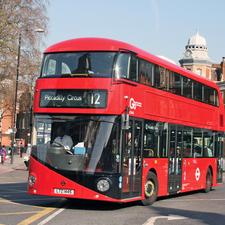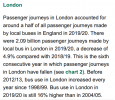At least two people on this thread are at best concerned only about the cost of the taxpayer and at least one has little concern about whether people use the services or not.
Whether you like it or not, the cost to the taxpayer is going to be a recurring theme. The UK Government has pretty consistently had a desire to reduce bus subsidies (or keep them stable at a time when there has been an increasing requirement), and there does not seem to be any indication that this is going to change anytime soon. We can ignore this fact on this forum and become an echo chamber of spending public funds to increase services, but what is the point of that? I know it is frustrating, but we are living in a culture where public transport, and especially local public transport, is not seen by individuals as a priority for public spending. People want cars. Just spending on public transport is unlikely to make much difference to congestion, without other steps (as mentioned by
@TheGrandWazoo) which are politically difficult, and therefore probably not that good value for money. It is not about getting people out of cars at any price.
We could have regulation with fully integrated services, but this will come with a high price tag. It can't be done on the cheap.
@Bletchleyite has given many illustrations of the system in Germany, The Netherlands and elsewhere. All these systems have higher levels of subsidy than ours, and are in countries where there is a broad consensus of agreement on the provision of such subsidies, the likes of which does not currently exist here. They have also been helped by the fact that their public transport systems have been developed as rail dominated (rather than buses competing with trains), and investment has been directed at the rail infrastructure for 50+ years. In short, if the UK wanted this system, we would not start from here. The Manchester suburban rail network would have to be considerably upgraded (frequency, train lengths, grade separation, interchanges) to come close to coping with a typical German system of bus feeders. 2 or 4 coach trains at comparatively wide intervals, already packed at peak times will not cut it! Even then there is a danger that these improvements would mainly result in existing users travelling more often, rather than achieving wholesale modal shift from cars.
In the 50s and 60s there were lots of public laundry facilities (both municipal and 'Laundromat'). As people got wealthier they purchased their own domestic washing and drying machines. Most of these public laundries have now closed down. Even if these laundries were free I doubt many more people would use them now, because the convenience of your own machine is far greater. Quite a parallel with buses and cars?
Of course I want to see a thriving, sustainable public transport system (thriving and sustainable meaning different things to different people). However I believe that merely changing the regulatory environment of bus services, without additional funding and restricting of private transport, is not going to achieve this goal.
Under deregulation it's possible to tender and subsidise loss-making services but only if they don't compete with a commercial service, and the rules put enough obstacles in the way of integration that a fully comprehensive and comprehensible network is impossible in any practical sense. In many cases funding more buses would be the best way of getting people out of cars - likely to be a fraction of the cost of a rail reopening for example and basically what Ken Livingstone did at the time of the congestion charge. But outside London, the current system doesn't allow that to happen.
The main reason, outside London, is not deregulation but a lack of funding. The obstacles referred to above can by and large be overcome by savvy Local Authorities, but they simply don't have the resources.



